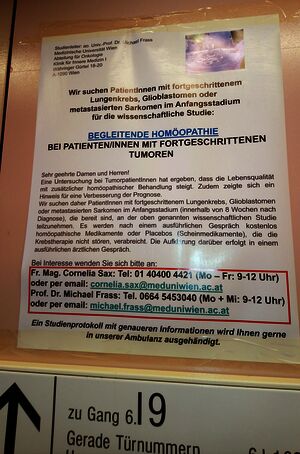Lung cancer homeopathy study update 2 – a devastating verdict from the ÖÄWI as well

Back to update 1 summary
Back to update 1 long version
In June 2021, we published a critique on our website, the INH website, and Edzard Ernst's website, written in collaboration with the German INH (Information Network Homeopathy), of a study claiming that homeopathy can improve the quality of life and survival of lung cancer patients with NSCLC (non-small cell lung cancer) in advanced stages. Some of the many authors of the study are employees of MeduniWien. We forwarded this critique to the rectorate and ethics committee of MedUni Vienna and to all authors of the study. We sent a letter to the editor of The Oncologist criticizing the study and recommending that it be retracted.
None of the large number of authors responded. The letter to the editor was also not published.
Meduni Vienna responded to our criticism and took action – the results of the ÖAWI assessment were devastating.
Meduni Vienna took our criticism seriously and forwarded it to the ÖAWI (Austrian Agency for Scientific Integrity) for review.
The results of this investigation are now complete. The ÖAWI has come to essentially the same conclusion as INH and IWM:
The OeAWI committee has come to the conclusion that there are numerous breaches of scientific integrity in this work, and that the publication is not a fair representation of the research. We have informed the Editor in Chief of The Oncologist and requested a retraction. A full report has been sent to the MUW.
Some details
The ÖAWI has issued the following statement regarding the numerous changes to the study protocol while the study was already underway that we have also criticized:
These changes are substantial and hardly acceptable once a study is running. Furthermore, they are not mentioned in the publication, nor is there mention of the patients with glioblastoma and sarcoma who were initially randomized. This is suggestive of data manipulation, and the lack of transparency in the article is unacceptable.
The ÖAWI on the miraculous proliferation of exclusion criteria, which we have also criticized
The article states, literally, that there were “numerous exclusion criteria”, and these are listed in the article. Only two of these criteria, i.e., pregnancy and use of other alternative medication, were listed in any of the six versions of the protocol that were submitted to the Medical-Ethics Committee between July 2010 and July 2020. Given the age of the patients and the recency of diagnosis, few if any will have been pregnant or using other alternative medication. The last patient was included in 2017. The protocol with numerous exclusion criteria was submitted to ClinTrials.gov in 2020. Hence, many patients were excluded post-hoc, which is suggestive of data manipulation.
The magazine Profil, volume 2022, issue 43, dated October 23, 2022, pp. 58–61, also reported in detail on the results of the ÖAWI review under the title “Almost too good to be true.” The main author, Michael Frass, also speaks in the article and rejects all allegations.
While it was sufficient for the editors of the journal Nature Scientific Reports to retract a publication once it became clear that it had been based on homeopathic dilutions of antibodies that could no longer contain any effective molecules, the journal The Oncologist has so far failed to respond at all to our criticism and to the ÖAWI's demand to retract the study with a mere promise to publish an “Expression of Concern” by the end of calendar week 40. However, this promise has not yet been kept (as of October 27, 2022). Since there has been no retraction of the article, this “study” continues to appear in the automatic query of the Pubmed database on the website of the Comprehensive Cancer Center of Meduni Vienna. If the study were to be retracted, a note to that effect would appear there.
In the meantime, jubilant reports from homeopathy believers about the sensational results of this study can be found in many places, and it has also been promoted on TV appearances, e.g., in “Meryns Sprechzimmer” on September 14, 2022, on ORF III by Dr. Brunnthaler-Tschertneu, the president of the Austrian Society for Homeopathic Medicine.
For a more detailed chronology of the criticism and its consequences (as of March 21, 2025)
In a video, Norbert Aust from the German INH explains our criticism in detail.
Conclusion
-
The peer review process of The Oncologist journal has room for improvement
-
The devastating findings of the independent ÖAWI have not yet prompted The Oncologist journal to publish at least an “expression of concern” or to retract the publication.
-
Even a top journal such as Nature does not shy away from retracting a study when it becomes clear that it concerns homeopathy, even though it had made it through the peer review process.
-
However, the longer this study remains uncorrected in the scientific literature and is promoted, the more likely it is that patients may be misled into making the wrong decisions about their therapy. For evidence-based oncology, this study is probably not worthy of comment anyway.
-
The most important goal therefore remains to bring about a retraction of the study. Not least because it could damage the reputation of MedUni Vienna.